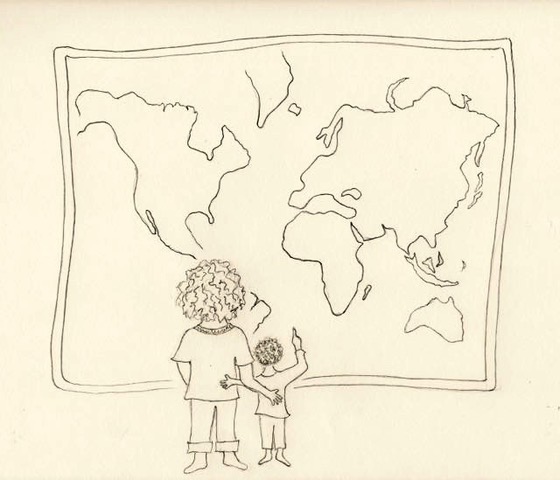
There’s nothing like a child to open your eyes to a parallel universe and give you the opportunity to make a small difference. This afternoon my six-year-old grandson, Liam, and I went on a little excursion. The plan was to go to the bank with a load of assorted coins, dump them all into the coin sorter and score a few bucks for a treat at the toy store or the bookstore. Things took a different turn. Here’s a short action-adventure story packed into less than 2 hours.
The coins were in a piggy bank left behind a few years ago by my now 35-year-old son. It wasn’t precisely a piggy bank; it was an atrociously ugly plastic basset hound bank – because my son loved all things basset including Louise, his own live hound. For years after he left home to sail off into the sunset on a long list of ships, he returned for a month or three from some far distant port and dumped all of his left -over pocket change (including a washer or two) into the plastic basset. Before leaving home today, Liam and I dumped the contents of the basset bank into a bowl and sorted out all the foreign coins from Polynesia, Canada, France, Indonesia, Australia and elsewhere. We arrived at the credit union only to realize it was Veterans’ Day, and of course, it was closed.
What do you do when plans go south? Make another plan. So we strolled down the street toward the donut shop with a detour to the ceramics store, where you can choose, paint and glaze your own cup, cow or critter. Liam thought the ceramics store was a boring idea, but after a discerning look at all the options and a break-it-it’s-yours discussion, we decided to return and try this out another day. Shortly afterwards, with a donut under our belts, we headed for home.
Downtown streets were under construction, so I changed my usual route, taking us past a line of campers parked at the curb of an out-of-way street. I pointed to the RV’s and explained to Liam that these belonged to homeless people. Liam is a very verbal guy, and what ensued was a long conversation about what the word homeless meant and why these people couldn’t park their campers in their own driveways.
Next came a brief stop at the art store to pick up some supplies. The art store opens into a small gallery with a display of local paintings. Ever curious, Liam walked right up to the one that called to him and naturally put out his hand to feel the surface. Before his fingers reached their target, I told him we weren’t allowed to touch the paintings. Being Liam, he wanted to know why not – in detail. “Why can’t I touch it, Nana? Do I have to buy it if I break it?” “Not quite.” I explained. “This is a little different.” From there the conversation roamed from dirty, oily hands and finger prints to museums and museum guards and the price of art.
Since the day and the conversation were ranging far and wide, I decided to take another very short (but longer in a sense) detour on the way home. On the shoulder of a road that runs past our industrial waterfront is a very visible homeless encampment. There are a couple of shopping carts full of possessions, a bike or two, piles of gear and two large blue and silver makeshift tents. I explained that these people were homeless but with no campers, just their tarps and gear. The rest of the way home we discussed what it meant to be poor and why not everyone could sleep in their own bed at home, just get a job, save money for a place to live and more. In the end Liam said, “At night, in bed, sometimes I think about stealing money from rich people to give to poor people.” “Sometimes I think that too,” I replied, “but stealing from anyone, no matter who, is not a good thing to do.” I later learned they were reading Robin Hood in kindergarten. Liam was pondering a local application.
••••
Trackbacks/Pingbacks